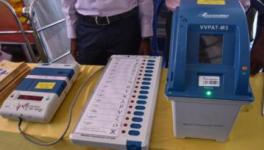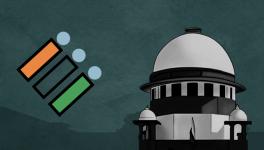Pegasus Case: Centre Did Not Cooperate in Probe, Says SC
Representational use only.
New Delhi: The Supreme Court on Thursday said the technical panel appointed by it to probe the unauthorised use of Pegasus has found some malware in five mobile phones out of the 29 examined but it could not be concluded that it was due to the Israeli spyware.
After perusing the report submitted by former apex court Justice R V Raveendran, Chief Justice N V Ramana also noted that the Central government did not cooperate with the Pegasus probe.
The top court last year ordered a probe into the allegations of the use of Israeli spyware by government agencies for targeted surveillance of politicians, journalists, and activists and appointed technical and supervisory committees to look into the Pegasus row.
The three-judge bench said the overseeing panel has submitted a "lengthy" report in three parts. One of the parts suggested amending the law to protect citizens' right to privacy and ensure the nation's cyber security.
"They (Committees) have observed that the Government of India did not cooperate. Whatever stand you had taken here, you have taken the same stand before the committee also", the bench, also comprising Justices Surya Kant and Hima Kohli, said.
Referring to a report of the technical panel, the bench said it was "little concerned" as it appeared that out of 29 phones, which were submitted to the technical committee for examination, five had some "kind of malware" but it cannot be said that these are due to Pegasus.
"So far as the technical committee report is concerned and it appears that there is a request from the persons, who have given their phones, that the report not be shared...it appears that some 29 phones have been given and in five phones, they found some malware but it does not mean that it is a malware from the Pegasus...,"the CJI said.
The bench said the report of Justice Raveendran has suggestions on protecting the citizens’ right to privacy, the future course of action, accountability, amending the law to improve privacy protection and the grievances redressal mechanism.
It said that the report of the overseeing judge suggested some remedial measures and one is that there should be "amendments in the existing laws and the procedures on surveillance and right to privacy."
"Second is enhancing and improving the cyber security of the nation," the bench said, adding that the report also suggested the "establishment of a mechanism for citizens to raise grievances of illegal surveillance."
Noting that it was a "huge report", the bench said it will see what portion can be given and added that there was also a request not to release the report.
"These are technical issues. So far as Justice Raveendran's report is concerned, we will upload it on the website," the CJI said.
Senior lawyers Kapil Sibal and Rakesh Dwivedi urged the bench to release a "redacted report" to the litigants.
When the bench said the Centre did not cooperate, Solicitor General Tushar Mehta responded by saying he was unaware of that.
The court will now hear the matter after four weeks.
The technical panel, which included three experts on cyber security, digital forensics, networks, and hardware, was asked to "inquire, investigate and determine" whether Pegasus spyware was used for snooping on citizens and their probe would be monitored by Raveendran.
The panel members were Naveen Kumar Chaudhary, Prabaharan P, and Ashwin Anil Gumaste.
Justice Raveendran, who headed the monitoring panel, was assisted by former IPS officer Alok Joshi and cyber security expert Sundeep Oberoi in monitoring the inquiry of the technical panel.
The apex court, in its order, had said that the probe panel would be empowered to enquire and investigate what steps or actions have been taken by the Centre after reports were published in 2019 about the hacking of WhatsApp accounts of Indian citizens, using the Pegasus suite of spyware.
Also whether any Pegasus suite was acquired by the Union of India, or any state government, or any central or state agency for use against the citizens of India.
An international media consortium had reported that over 300 verified Indian mobile phone numbers were on the list of potential targets for surveillance using the Pegasus spyware.
Get the latest reports & analysis with people's perspective on Protests, movements & deep analytical videos, discussions of the current affairs in your Telegram app. Subscribe to NewsClick's Telegram channel & get Real-Time updates on stories, as they get published on our website.























